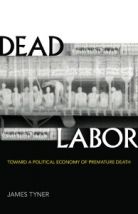Dead Labor: Toward a Political Economy of Premature Death

Dead Labor attempts to conceptualize a political economy of premature death, arguing that this can be characterized by an emerging “necrocapitalism”. Under necrocapitalism, the social relations of capitalism condition premature death through the unequal commodification of living labour. The book builds on Marxist critical theory; “dead labour” was a metaphorical concept coined by Marx to denote the products of labour that went into the production of an item, and which become reanimated when “living labour” acts upon it. The book extends this to a literal theorization of dead labour as the dead and dying bodies that work for political and economic ends. The book argues that premature death is increasingly a bio-economic issue, rather than biological or bio-political. In other words, one’s exposure to death is increasingly conditioned by one’s position in capitalism, as well as by the intersecting axes of exploitation and oppression one faces (i.e. ethnicity, gender, sexuality and citizenship).
The book draws on many examples to support the claim that capitalist social relations shape not only how we live but also how (and when) we die. One example is the tacit acceptance of heightened risk to workers’ health and safety, rather than corporate compliance with safety regulations, as exemplified by the 2013 explosion at the West Fertilizer Company in West, Texas. Another example is drawn from the proliferation of the live organ transplant market and the increasing commodification of body organs. Yet another example is the mounting death toll of those people attempting to migrate in search of labour opportunities to better their circumstances.
Chapter 3 delves into the current global architecture of capitalism. It argues that the neoliberal reorientation of global labour migration constructs a coercive immigration regime enacted through fear and intimidation, which effectively cheapens migrant labour. This serves to produce and reproduce a reserve army of surplus labour, which Marx argued is systemic to capitalism and serves to reproduce inequality between the labour and capital classes. Chapter 5 explores the “voluntary” sale of kidneys by poor individuals to the rich, who can afford to extend their lives at the expense of further impoverishment and increased vulnerability to premature death for the poor.
The book raises an important point: the capitalist profit imperative overrides concerns of health and wellbeing of workers, and capitalism causes unnecessary and avoidable premature death. As Marx wrote, “Capital… takes no account of the health and the length of life of the worker, unless society forces it to do so. Its answer to the outcry about the physical and mental degradation, the premature death, the torture of over work, is this: Should that pain trouble us, since it increases our pleasure (profit)?” As such, the book calls for cultivating an ethic of not allowing others to die prematurely, and eliminating those practices and policies that disallow life to the point of death.
Book note prepared by Kate Goh
Search the Book notes database
Our Book notes database contains details and summaries of all the publications included in Book notes since 1993 - with details on how to obtain/download.
Use the search form above, or visit the Book notes landing page for more options and latest content.
For a searchable database for papers in Environment and Urbanization, go to http://eau.sagepub.com/

